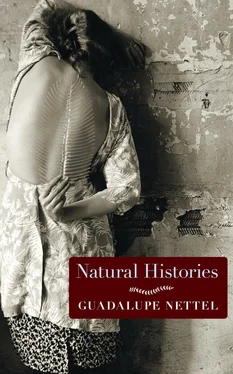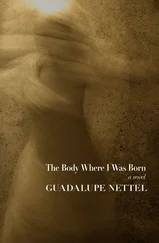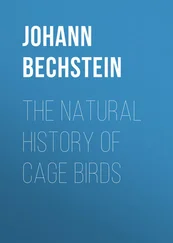That same Sunday my mother called from Bordeaux to announce she was coming to meet her granddaughter. She was thinking of spending a week in Paris and wanted to know if she could stay with us, or if we would rather she stayed in a hotel. I told her I would check with Vincent and call her the next morning to let her know, and then passed the phone to my husband so he could say hello. But he didn’t want to wait until Monday to give his opinion. “I’m sorry, mother-in-law dear, but this time you must stay somewhere else.” Hearing the irritated tone in which he spoke to my mother, I lost it.
“Who do you think you’re talking to, you goujat !” I screamed at him as soon as he hung up, hurling one of the toys he had decided to keep at his head. The screaming woke Lila, who started crying at the top of her lungs, making the atmosphere even tenser. When at last I was able to calm her down I went to bed, certain I had crossed an impassible line. That night Vincent slept on the couch and I in our bed, the baby in my arms.
Mom stayed at Hôtel de la Paix, a few blocks from our building. As soon as Vincent left for work, she came to the apartment and stayed with me the whole day, helping me with the laundry, the cleaning, and taking care of Lila. Rarely had we been so close. We would put Lila down to sleep before seven p.m. and drink tea while we spoke about marriage and its difficulties or the great challenges other family members have had to face. My mother had had three children and survived it. For once, I was completely open to her advice. Every evening she left before Vincent came home. What’s more, I noticed she did everything she could to erase all evidence of her presence from the apartment. For his part Vincent took advantage of her visit to stay late at the office and get ahead on his work. Right after Mom left I would settle in to eat dinner in front of the TV. I no longer watched the fish. Observing the aquarium for a long time made me sick. The life of those two conflicting beings saddened me. When he got home my husband would find me in bed, either with a book or having just fallen asleep. I realize it wasn’t the ideal situation for a couple but at least we were peaceful, and I would have given anything for that period to go on indefinitely. On Saturday at around ten a.m. my mother and I went to pick up Dad from the train station. He came to spend a few days with us, and of course to meet his granddaughter. That weekend it was unseasonably warm for Paris in March. We spent a lot of time outside, walking through the Marais and the Place des Vosges. On Sunday we took Lila to the Luxembourg Gardens for her first time. Vincent didn’t come with us on any of these outings. He wasn’t even kind enough to say goodbye to my parents. Our relationship didn’t get any better after they left. He still returned home after dinnertime and that routine, which began as an exception, became the norm.
This was around the time my maternity leave came to an end. I called the office to negotiate my return to work and, after some evasiveness, I was told that with the arrival of my temporary replacement, apparently an efficient and highly qualified young woman, things had become complicated. It was never explicitly expressed, but it was clear to me they didn’t want a lawyer with a different set of priorities. I asked for a meeting with the director of the firm, but he was away. From then on domestic life seemed insufferable. I no longer saw my time at home as the transitional phase into working motherhood, but rather a kind of house arrest that could go on forever. I felt unhappy and most of all, alone. It was almost Easter and travel agencies were bombarding viewers with images in ads on bus stops, in the streets, and on the television of happy families vacationing on beaches in the Caribbean or the Indian Ocean. Vincent had a week off and I suggested that we get out of Paris. When I stopped talking, he looked at me as if I had said something crazy.
“Our bank accounts are empty,” he said. “And we don’t even know if you’re going back to work.”
I then suggested we take a trip to the Southeast and stay at my parents’ place.
“You go and take the baby. It would be good for you to get some sun and for me to stay home and get some sleep.”
I didn’t hear a drop of sarcasm in this remark, and so I agreed to his suggestion.
Bordeaux was a veritable oasis. For the entire week Lila and I spent there, from morning until dinnertime, my parents took care of absolutely everything. I slept like I hadn’t in months and recovered a great deal from the accumulated fatigue. My siblings also came to our parents’ home with their numerous children. We swam in the pool and on Easter Sunday, following the English tradition, we went hunting for chocolate eggs. Vincent called almost every afternoon to ask about his daughter. Over the phone his voice sounded affectionate and caring, like in the years before her birth. He told me we did well to take a break from each other. In these idyllic surroundings I was able to forget about the law office and I felt truly happy. But too soon it was time to go back. I had no obligation to do so, or even any desire to recoup my work or my daily life. My parents were delighted to have us there. If I went home it was for Vincent. He really wanted to embrace his wife and daughter — at least he said he did — and I for things to be good between us. When the train pulled out of the station and I saw my parents waving through the window, I struggled not to burst into tears.
Vincent came to pick us up in the car. Despite all his smiling, I saw he was nervous. It must have been about nine. It was raining, of course. I remember the light from the streetlamps reflecting on the pavement. Lila was sleeping in her car seat. After asking the obligatory questions — how have you been? how was the trip? — he announced he had something to tell me before we got home.
“It’s about the fish,” he said. “Two days ago they had a fight and both of them are hurt pretty badly.”
He then gave me the details: Friday morning he had found them floating on the top of the tank.
“I have no clue what to do with them. The only thing I could think of was to separate them. I took the male out with the net and put him in the fishbowl Pauline gave us. A specialist is coming tomorrow.”
“Was she in heat, do you know?” I asked, trying to imagine the reasons. “Did you see a dark stripe on her body?”
But Vincent hadn’t seen the colorful fins unfolding the way they had the first time.
Never in all the years I lived in that apartment had I seen it so bleak. It smelled like the fish tank was giving off a rotten stench. The fish did look hurt, but much less so than what I had imagined on the way home, listening to Vincent’s account.
What made me most sad that night and the following days was seeing our fish apart. I got the sense that the distance affected them too, and they were missing each other.
“How is it possible in an aquarium so big and beautiful they weren’t able to live in peace?” I asked my husband one afternoon, as we were watching the male swimming in circles like a lunatic in the old container, now located on the kitchen counter.
“Maybe it’s not a question of space,” he responded, “but of their nature. They are Bettas , remember.”
I realized he had given the matter a lot of thought.
“Other fish,” he went on, “feel free in very small bowls. To them they are universes, bright and full of color. To them, each beam of sunlight represents a world of possibilities. Betta fish on the other hand may see the biggest bowl as very small. They never have enough space and they always feel threatened, even by their mate. It is with all that pressure on them that they interpret the other’s nature. I’m not making this up; I read it in one of the books you took out of the library and, by the way, haven’t returned yet. Do you know how much the late fee increases every day?”
Читать дальше












